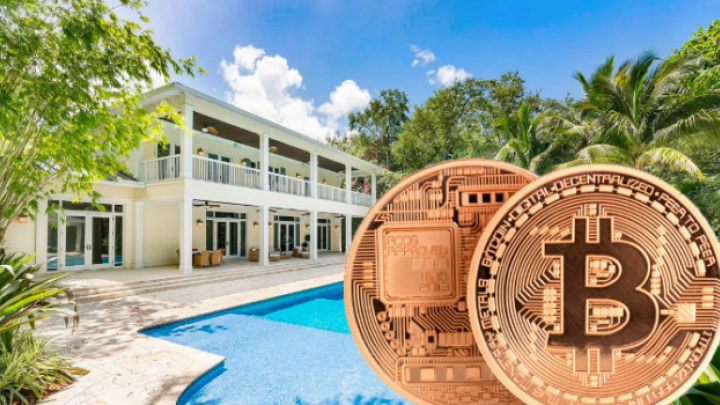How To Buy a House In Spain Using Bitcoins
If you're looking for information on how to buy a house with Bitcoin in Spain, you'll likely find articles that tell you it's possible but ultimately advise you to convert your Bitcoins into Euros before completing the transaction. However, this is not what you were looking for. In this article, we will explain how to buy and sell a house in Spain using Bitcoin without converting them into Euros.
Assuming that you are familiar with Bitcoin being an unregulated cryptocurrency with extremely volatile value and is not accepted as a legal tender in any country except for El Salvador, we won't waste time discussing this further. Additionally, finding a seller who accepts cryptocurrency as a form of payment is also a challenge since a Forex Suggest report indicates that there are 289 real estate properties in Spain that can be purchased with cryptocurrencies.
The first step in buying a house with Bitcoin is to set a date and time to define its value
It is recommended to agree with the seller on a reference in fiat currency to value the property and set a specific date to establish the exchange rate between Bitcoin and the fiat currency.
Once the essential terms of the transaction are established, the simplified process for buying a house with Bitcoin would be to formalize the sale and purchase agreement before a notary, setting the price in fiat currency and using Bitcoin as the method of payment instead of fiat currency.
Unlike traditional property purchases, the transaction will be carried out by delivering Bitcoins for the property's value instead of delivering fiat currency.
It wouldn't be a sale and purchase agreement but rather a swap
There is no clear definition from the Spanish Tax Agency regarding the taxation of real estate transactions involving cryptocurrencies. Some notary and registry experts suggest that this operation may not be considered a real estate sale and purchase agreement but rather a swap since the payment is made through cryptocurrencies in an exchange of goods and/or values (which the Tax Agency currently equates to cryptocurrencies for tax purposes), where both parties assign a value in fiat currency. The fact that the object of the exchange is a virtual currency does not prevent it from being considered a financial swap.
According to Article 1538 of the Civil Code, a swap is a contract whereby both parties agree to exchange one thing for another. This type of contract is generally governed by the provisions applicable to the sale and purchase agreement, and is an interesting alternative for the exchange of various types of goods, which has been used since ancient times under the barter formula.
The transaction, a key moment
In a traditional sale where payment is made using the legal currency of the country where the transaction takes place, payment is usually made through the delivery of a certified and nominative check issued by the bank, which the buyer hands over to the seller at the time of signing the public deed before a notary. However, in this case, we cannot deliver a document certifying that the proof of payment is guaranteed by a banking institution, as this does not exist yet and is not regulated in Spain. In this case, what is delivered in exchange for the property is a financial value (as the Spanish Tax Agency currently considers it). The transfer of bitcoins from buyer to seller can be made between the digital wallet that each one owns on their respective exchange, from a cold wallet to exchange (and vice versa), and the most recommended, from a cold wallet (buyer) to another cold wallet (seller). And the latter is the most recommended, as any transaction involving the intervention of a third party, such as an exchange for example, can take from a few minutes to several hours. If you want to know more about this last method, we leave you this link, but if you are thinking of carrying out an operation of this type, we assume that you are familiar with it with the necessary expertise. Once the public and private keys of the bitcoins have been transferred, we can say that the payment has been made.
What about its tax effects?
Regarding the taxation of this type of transaction, we must indicate that it is subject to the same taxes as a sale and purchase agreement with legal tender, which is why it is necessary to set its value in fiat currency as we mentioned before. If it is a new property and, therefore, a first transfer, it is subject to VAT, and if it is a second-hand property, it is subject to the transfer tax applicable in the autonomous community where the real estate is located and other factors that determine it.
Likewise, the exchange rate set between buyer and seller, or the value given to the real estate property, will affect the payment of the Plusvalía that the seller will have to pay and that, obviously, cannot be made in Bitcoin.
On the other hand, the buyer will have to face the settlement of taxes for the capital gain or loss since the moment he acquired the Bitcoins until the time of the swap. It is worth remembering that profits derived from the investment of crypto assets must be included in the capital gains of the savings taxable base (Article 33.1 of the IRPF Law).
And what about money laundering?
It is important to take into account the measures applied in the buying and selling of property in accordance with Law 10/2010 on the prevention of money laundering and the financing of terrorism, as well as the upcoming AML6 European Directive and the Bill on Measures for the Prevention and Fight against Tax Fraud, which will include mechanisms for reporting on balances and ownership of cryptocurrencies held by each individual.
In Spain, the purchase and sale of property require verification and justification of the origin of the funds that will be used to acquire the property, as well as their traceability. Although this aspect has not been of particular concern for the average buyer, in the case of acquiring properties with cryptocurrencies, it is recommended that the buyer certifies and guarantees the legality and origin of the funds before formalizing the transaction. To do this, it is necessary to carry out some prior procedures, such as the real identification of the buyer and the verification of the origin of the funds, as established in the Anti-Money Laundering Law and its regulations.
The purchase and sale of properties with cryptocurrencies in Spain remain a controversial issue that generates differing opinions among professionals in the sector and real estate law. While some consider this purchasing modality an interesting alternative to facilitate the process of acquiring real estate, other experts question its viability due to the fluctuations in the value of Bitcoin and the lack of regulation in this area. Therefore, it is essential to have good legal advice to carry out a safe and trouble-free transaction.

Miguel S. Moreira
Miguel is a trained architect and building engineer with a ample experience in the real estate sector. He is the co-founder of Valido Home and loves to inform about the risks involved in purchasing property in Spain.




